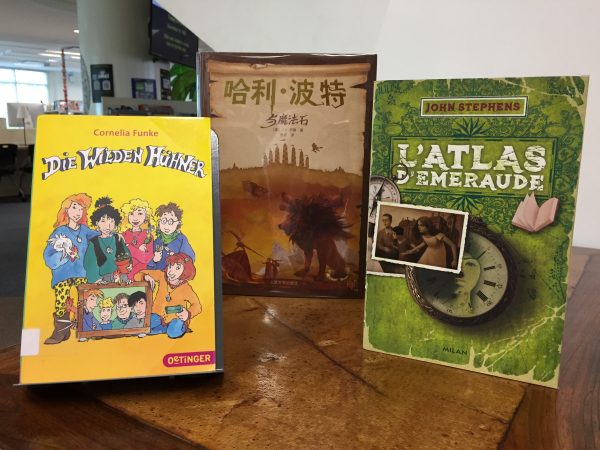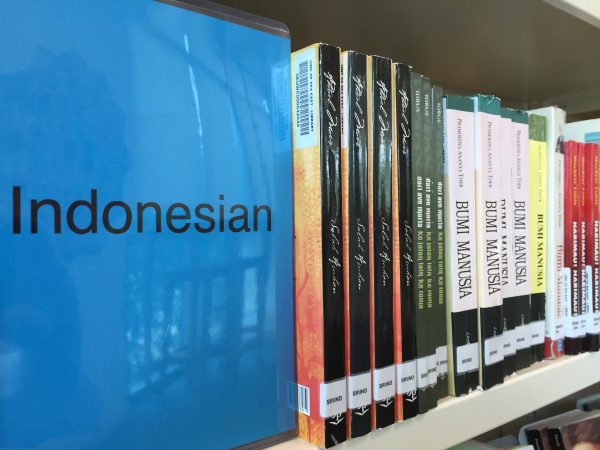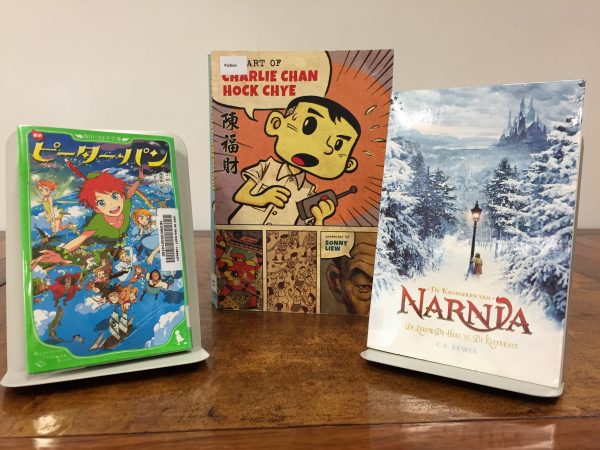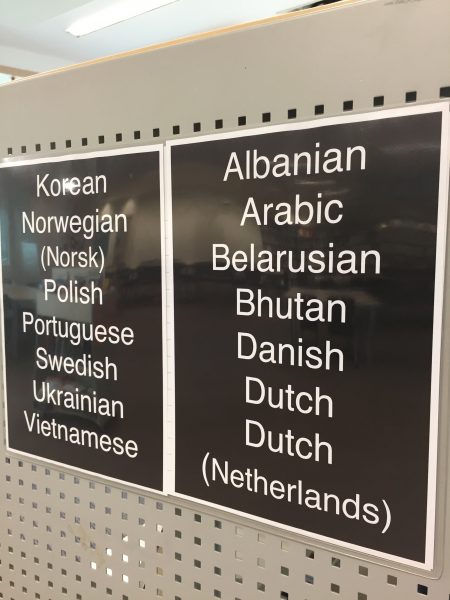New Job, New Country, New Literature: A librarian starts a new chapter in Singapore
Susan Grigsby has embarked on the adventure of a lifetime, leaving the U.S. for a school librarian position in Singapore. Here she shares some prized new finds as she begins to explore a whole new world of children's literature.

A selection from the Hindi shelf.
I was sitting in the baggage claim area of the airport in Frankfurt, Germany, waiting for the bus that would take me to my son’s family in Spangdahlem, when I got the email offering me a job as a teacher librarian at the United World College of Southeast Asia (UWCSEA) in Singapore. After the initial shock, I replied to the email with an enthusiastic yes. But on that two-hour bus ride, I started to wonder what I’d gotten myself into. I knew no one in Singapore. Newly single after 27 years, I would be traveling to the other side of the planet alone. I had no international school experience and limited experience with the International Baccalaureate (IB). I had just four short months to separate the things I would take from the things I would store, find a foster home for my cat, sell my car, and attend to all the tiny details one must check off when absolutely everything is about to change. If my work with the Lilead Fellows Program had taught me anything, it was this: Change is a constant, and landing on your feet is all about attitude, determination, and a solid sense of “I can do this!” I was warmly welcomed when I arrived in Singapore, and before I’d been here a full 24 hours, I made my way to my new library to take a look around. There on the shelves were old “friends”: Sharon Creech, Gary Schmidt, J.K. Rowling, Kate DiCamillo, and so many more. I found myself smiling as I thought, “I’ve read that one!” over and over again. I felt like I really wasn’t so far from home if I was going to be surrounded with the books and stories I knew and could share with young readers.A Whole New World of Reading

From left: Cornelia Funke's "The Wild Chickens" in German; J.K. Rowling's "Harry Potter" in Chinese; John Stephens's "The Emerald Atlas" in French.
It was about that time that another reality snuck up behind me and tapped me on the shoulder. There were many, many books on the shelves I’d never seen. Characters I’d never met. Authors I didn’t know. I picked up a few to see they were published in Australia, New Zealand, Singapore, China, and a variety of other Asian countries. I realized that the scope of my experience with literature was heavily weighted with authors and publishers from the United States, Canada, and the U.K. I had a lot to learn. I started by looking at the list of suggested purchases left by the previous librarian. She had years of international school experience and a vast knowledge of world literature. I combed through the lists, reading reviews and synopses to get a sense of the types of books she’d selected for the library. I followed my fellow teachers on Goodreads to see what they were reading and, most important, what they were saying about what they were reading. I spent time going through the library catalog to look at the books that were English translations to get more familiar with the authors writing quality literature for students in grades six through 12.
Signage for the Indonesian section.
I should note that UWCSEA has a strong reading culture, so the range of resources available to me is extensive. There is no reading incentive program here, nor restrictions on what students read or how many books they can borrow at a time. Students are coached in keeping reading notebooks to maintain a running list of what they’ve read, what they want to read, and titles that sound interesting and might be worth a second look. They are consistently reminded that not all books are for all readers, and teachers place a high level of trust in students to make appropriate selections based on their reading stamina, abilities, and sensibilities. As a result, it is not unusual for students to read 25 to 30 books every school year. I have been in schools where true readers are in the minority, so this is an enviable spot I find myself in. The beauty of it is that students are telling me about books I don’t know and encouraging me to read a new author or title that is unfamiliar! In a school in which everyone is from somewhere else, it is simply not appropriate to focus narrowly on particular authors, settings, languages, or cultures. To comply with IB standards, UWCSEA has made a conscious effort to collect a broad selection of titles in mother tongues. We have books in Chinese, Fijian, Russian, French, Spanish, Indonesian, Arabic, Finnish, Dutch, and more. While some of these are translations from the English, most are written by authors who speak the language and live within the culture represented by the book. Even so, finding YA fiction written by Southeast Asian authors is a challenge, and just the attempt has opened my eyes to the rich body of literature that is available outside the U.S.the Red Dot Book aWARDS

From left: A graphic novel "Peter Pan" in Japanese; "The Art of Charlie Chan Hock Chye" by Malaysian-born artist/illustrator Sonny Liew; C. S. Lewis's "The Chronicles of Narnia" in Dutch.
Singapore librarians have a tradition of creating the Red Dot book list, a set of suggested titles for early years (ages 3–7), younger readers (7–10), older readers (10–14), and mature readers (14–adult) from children’s literature first published in English within the past four years. The goal is to offer “a range of books from around the world,” with a mix of genres, male and female protagonists, and nationalities. This year’s list has an interesting selection, some of which may be familiar to American librarians and some not. I also recently had the good fortune to stumble across the Ubud Writers & Readers Festival in Bali at the end of October. I bought a day pass and went to conference sessions featuring Indonesian, Balinese, and Nepalese authors sharing their origin stories, journalists discussing the current distrust of legitimate news sources, Ian Rankin talking about his "Inspector Rebus" series, Madeleine Thien, author of Do Not Say We Have Nothing (Knopf Canada, 2016) discussing the idea of revolutionary idealism in her book, and a group of Iranian women authors, one of whom was jailed for her writing. The theme of the festival was origins, and each speaker had an original voice, a unique cultural point of view, and some very personal stories to tell.
Some of the languages featured in the UWCSEA library.
I was able to pick up quite a few titles to bring back to Singapore, and I’m excited to share them with the English department. Author Shokoofeh Azar (Iran/Australia) said something during her panel’s discussion that stuck with me: If you want to know a culture, read its literature—not its history. History can be rewritten (and it is rewritten all the time), but the literature of a culture carries its soul. With that I realize I have come full circle. My initial sense of belonging at seeing the stories I knew sitting on shelves halfway around the world from anywhere I’d ever been before came back to rest in my heart. Now I am moving beyond my stories and toward the stories being told by voices new to me. I am joining a larger body of work by reading the literature of other cultures so that I can come to a better understanding. I urge you to look deeper and further for the stories you will share with your students. Ask publishers for translated works. Look for small press titles that feature authors telling the stories of their cultures. Our human story is rich and colorful and there is room in it for many different voices.Some recommended titles
Bohang, Lala. The Book of Forbidden Feelings. (Kompas Gramedia, 2016) ISBN 9786020331898. (Poetry, art) Croggon, Alison. The River and the Book. (Walker Books, 2015) ISBN 9781406356021. (Magical realism, Red Dot short list) Deswandhy, Andari. Enchanting Tales from Indonesia. (Kompas Gramedia, 2017. ISBN 9786020338743. (Indonesian folk tales - children) Kumala, Ratih. Cigarette Girl. tr. by Annie Tucker. (Monsoon Books, 2017) ISBN 9789814625470. (Historical fiction) Kurniawan, Eka. Vengeance Is Mine, All Others Pay Cash. tr. by Annie Tucker. (Pushkin Press, 2017) ISBN 9781782272441. (Realistic fiction - mature content) Madasari, Okky. 86. (Kompas Gramedia, 2015) ISBN 9786020319612. (Realistic fiction) Mohamad, Goenawan. On God and Other Unfinished Things. tr. by Laksmi Pamuntjak and author. (Kompas Gramedia, 2015) ISBN 9786020323121. (Poetry, literature)Susan K.S. Grigsby has served as district media specialist in Forsyth County (GA) Schools. She is a 2015–16 Lilead Fellow.
RELATED
RECOMMENDED
CAREERS
The job outlook in 2030: Librarians will be in demand
CAREERS
The job outlook in 2030: Librarians will be in demand
ALREADY A SUBSCRIBER? LOG IN
We are currently offering this content for free. Sign up now to activate your personal profile, where you can save articles for future viewing





Add Comment :-
Comment Policy:
Comment should not be empty !!!
Liz Montanaro
A beautifully written, wise and thought provoking article that reminds me how priveleged I am to work in school libraries and how rich and rewarding the pool of literature is that we dip (or submerge) into. Thank you for sharing your experience.Posted : Jan 09, 2018 05:01
Craig Seasholes
What a great adventure, Susan! Thanks for bringing us along your journey and sharing your thoughts from along the way. My own experience with school libraries in Kathmandu are among the most memorable of my career. I look forward to hearing more, from wherever life's roads lead you.Posted : Jan 07, 2018 08:45
Jan Wilson
Susan...great article and opportunity for you! I still remember our days at GSU. Congrats and good luck!Posted : Jan 04, 2018 05:10
Vicky Spera
You are missed in FC, but so glad your adventure is a true adventure in life and in literature! Learning Norwegian (Bokmal) using duolingo (why? Idk but I like it!) just started searching for children’s books to read to help me along! If you know of any, you know my email address.Posted : Jan 03, 2018 02:09
Jane Lofton
Thanks so much for sharing your story, Susan. It inspires all of us to reach out and learn about literature from other places. And, I loved Shokoofeh Azar's comment.Posted : Jan 02, 2018 10:34